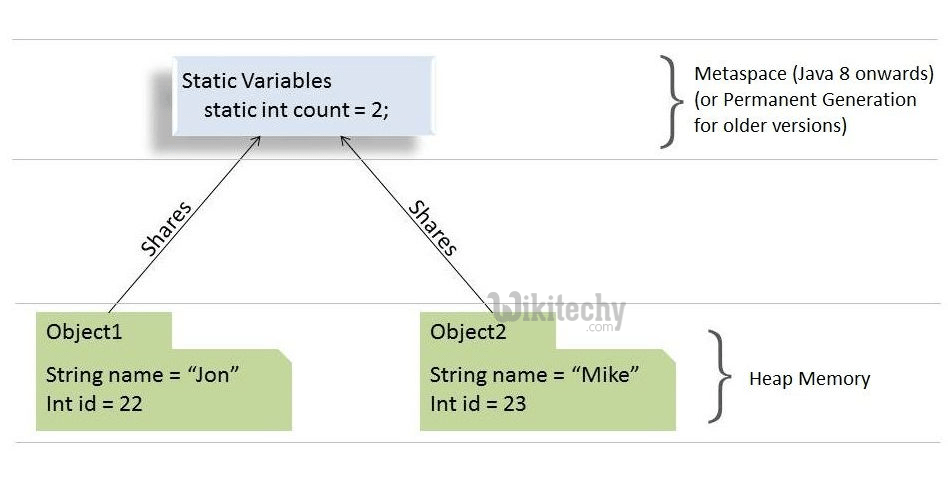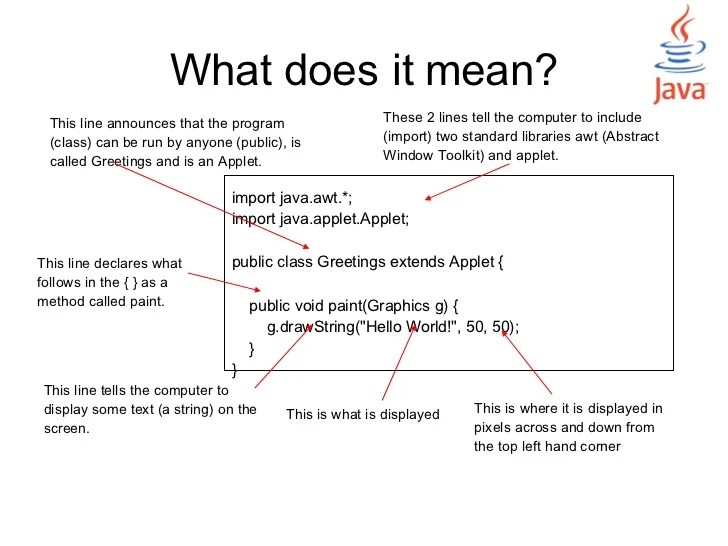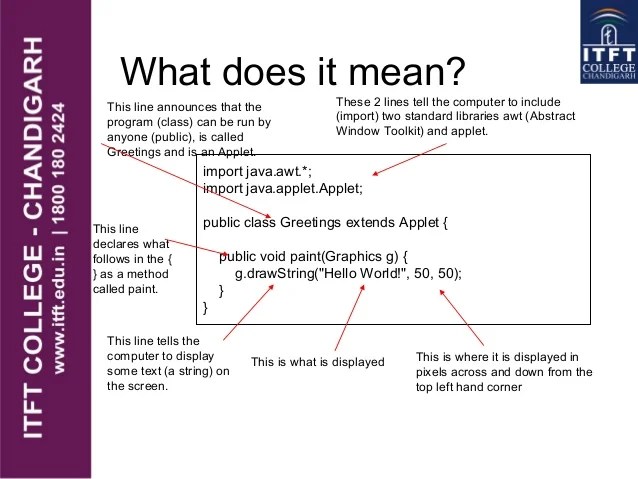Let's define this short function: ++ operator will be used before the variable, i.e., “++ variable”.
Step By Step What Does Field Mean In Java With New Ideas, Fields defined without the static keyword.their value is unique to each instance (object) of a class. A final variable is called a blank final variable if it is not initialized while declaration.
 Java Static Fields By Microsoft Awarded MVP Learn in 30sec wikitechy From wikitechy.com
Java Static Fields By Microsoft Awarded MVP Learn in 30sec wikitechy From wikitechy.com
The %= operator is often used to assign booleans since the result is the remainder. Let’s see an example of void keyword usage. A field provides information about, and dynamic access to, a single field of a class or an interface. If any field gets changed, it is said that the object's state (as a whole) has changed.
Java Static Fields By Microsoft Awarded MVP Learn in 30sec wikitechy The static field is effectively associated with the class object, which is in turn associated with a classloader.
In this article we will go through what does static mean java using code in java. The state of an object is the combination of the values of all its fields. A field, also known as a member variable, is a variable declared as part of a class, so that each instance of that class contains an instance of that variable. If any field gets changed, it is said that the object's state (as a whole) has changed.

The state of an object is the combination of the values of all its fields. The java virtual machine has its own complete hardware architecture, such as processor, stack, register. In java, void keyword is used with the method declaration to specify that this particular method is not going to return any value after completing its execution. It is a shorthand assignment operator commonly referred to as “compound addition assignment operator”. What do you mean by private in java? Quora.
 Source: wikitechy.com
Source: wikitechy.com
Let’s see an example of void keyword usage. The static field is effectively associated with the class object, which is in turn associated with a classloader. A field permits widening conversions to occur during a get or set access operation, but throws an illegalargumentexception if a narrowing conversion would occur. The += operator performs two functionalities in one go i.e. Java Static Fields By Microsoft Awarded MVP Learn in 30sec wikitechy.
 Source: geeksforgeeks.org
Source: geeksforgeeks.org
It is a shorthand assignment operator commonly referred to as “compound addition assignment operator”. For example in this declaration: It divides the variable by the right operand and stores the result in the variable. Sets the value of a field as a float on the specified object. What is the difference between field, variable, attribute, and property.
 Source: youtube.com
Source: youtube.com
What does instance field mean in java? The reflected field may be a class (static) field or an instance field. The java virtual machine has its own complete hardware architecture, such as processor, stack, register. A final variable is called a blank final variable if it is not initialized while declaration. Java 8.1 Static Fields & Methods YouTube.
 Source: journaldev.com
Source: journaldev.com
Firstly, it performs the addition on the operands, and then it assigns the result to the left operand. This method is equivalent to set (obj, fobj) , where fobj is a float object and fobj.floatvalue () == f. It is used to increment/increase the value of a variable, and it can be used as either prefix or postfix. A final variable is called a blank final variable if it is not initialized while declaration. java.lang.NullPointerException JournalDev.
 Source: stackoverflow.com
Source: stackoverflow.com
What does ++ mean in java. Field class can retrieve information about the field such as its name type modifiers and annotations. A field is a variable of any type that is declared directly in a class or struct The reflected field may be a class (static) field or an instance field. oop Why Java initializing only class variables by default but not.
 Source: slideshare.net
Source: slideshare.net
If the field is static, the obj argument is ignored; What is a field in a class? Firstly, it performs the addition on the operands, and then it assigns the result to the left operand. In simple words, we can say that the variable1. Java Programming for Designers.
 Source: o7planning.org
Source: o7planning.org
In this article we will go through what does static mean java using code in java. The set () method of java.lang.reflect.field is used to set the value of the field represented by this field object on the specified object argument to the specified new value passed as parameter. What does += mean in java. A final variable is called a blank final variable if it is not initialized while declaration. Access modifiers in Java.
 Source: youtube.com
Source: youtube.com
In simple words, we can say that the variable1. State is more of a usage pattern than a particular way to define a class's properties. The %= operator in java is similar to the += operator. This approach is the most common. Java Static YouTube.
 Source: stackoverflow.com
Source: stackoverflow.com
A final variable can only be initialized once, either via an initializer or an assignment statement. What does /= mean in java? What is field in java program? What does += mean in java. swing Java. Null meaning of object field Stack Overflow.
 Source: javalanguageprogramming.blogspot.com
Source: javalanguageprogramming.blogspot.com
What is a field in a class? What does /= mean in java? The static field is effectively associated with the class object, which is in turn associated with a classloader. This approach is the most common. JAVA PROGRAMMING Concept of Encapsulation in Java.
 Source: runestone.academy
Source: runestone.academy
The java virtual machine has its own complete hardware architecture, such as processor, stack, register. It is used to increment/increase the value of a variable, and it can be used as either prefix or postfix. For example in this declaration: A final variable is called a blank final variable if it is not initialized while declaration. 2.8. Intro to Java Summary — AP CSA Java Review Obsolete.
 Source: stackoverflow.com
Source: stackoverflow.com
The %= operator in java is similar to the += operator. What does ++ mean in java. ++ operator will be used before the variable, i.e., “++ variable”. What does += mean in java. Java Can final variables be initialized in static initialization.
 Source: blog.eduonix.com
Source: blog.eduonix.com
The operator a/=b is equal to a = a / b. State is more of a usage pattern than a particular way to define a class's properties. Let’s see an example of void keyword usage. So if these two programs use separate classloader instances, you'll have two independent static variables. Learn To Create A Login Page Class Form In Java Using Netbeans.
 Source: slideshare.net
Source: slideshare.net
The java virtual machine has its own complete hardware architecture, such as processor, stack, register. The reflected field may be a class (static) field or an instance field. The static field is effectively associated with the class object, which is in turn associated with a classloader. A final variable can only be initialized once, either via an initializer or an assignment statement. ITFT Java Coding.
 Source: slideshare.net
Source: slideshare.net
If any field gets changed, it is said that the object's state (as a whole) has changed. Answer instance variable is a variable declared. What is a field in a class? In this article we will go through what does static mean java using code in java. Java basics.
 Source: o7planning.org
Source: o7planning.org
What does /= mean in java? A field, also known as a member variable, is a variable declared as part of a class, so that each instance of that class contains an instance of that variable. The new value is automatically unwrapped if the underlying field has a primitive type. The reflected field may be a class (static) field or an instance field. Access modifiers in Java.
 Source: youtube.com
Source: youtube.com
The static field is effectively associated with the class object, which is in turn associated with a classloader. The java virtual machine has its own complete hardware architecture, such as processor, stack, register. Java field class with examples on java, field, equal(), getannotatedtype(), getannotation(), get(), java tutorial, history of java, features, abstract, class, object. This approach is the most common. Java Basics Part 1 Q 14)Difference static and instance variables.
 Source: java67.com
Source: java67.com
It divides the variable by the right operand and stores the result in the variable. You can initialize a final variable when it is declared. A field, also known as a member variable, is a variable declared as part of a class, so that each instance of that class contains an instance of that variable. This is a java code snippet that we will use in this article. What is Variable and Method Hiding in Java Example Tutorial Java67.
 Source: w3resource.com
Source: w3resource.com
Firstly, it performs the addition on the operands, and then it assigns the result to the left operand. /*static means that the variable or method marked as such is available at the class level. The set () method of java.lang.reflect.field is used to set the value of the field represented by this field object on the specified object argument to the specified new value passed as parameter. So if these two programs use separate classloader instances, you'll have two independent static variables. Java Class, methods, instance variables w3resource.
 Source: youtube.com
Source: youtube.com
A field is a variable of any type that is declared directly in a class or struct This method is equivalent to set (obj, fobj) , where fobj is a float object and fobj.floatvalue () == f. A field permits widening conversions to occur during a get or set access operation, but throws an illegalargumentexception if a narrowing conversion would occur. This is a java code snippet that we will use in this article. JAVA Static and Return YouTube.
 Source: w3resource.com
Source: w3resource.com
It is used to increment/increase the value of a variable, and it can be used as either prefix or postfix. For example in this declaration: This approach is the most common. The += operator performs two functionalities in one go i.e. Java Class, methods, instance variables w3resource.

Sets the value of a field as a float on the specified object. A field provides information about, and dynamic access to, a single field of a class or an interface. ++ operator will be used before the variable, i.e., “++ variable”. Let’s see an example of void keyword usage. How does one properly override the equals method in Java? Quora.
 Source: netjstech.com
Source: netjstech.com
It is a shorthand assignment operator commonly referred to as “compound addition assignment operator”. The new value is automatically unwrapped if the underlying field has a primitive type. A final variable is called a blank final variable if it is not initialized while declaration. If the field is static, the obj argument is ignored; final Keyword in Java With Examples Tech Tutorials.
 Source: youtube.com
Source: youtube.com
This approach is the most common. If the field is static, the obj argument is ignored; You can initialize a final variable when it is declared. The operator a/=b is equal to a = a / b. F1L712 Employee java static variables YouTube.
Let's Define This Short Function:
So if these two programs use separate classloader instances, you'll have two independent static variables. It is used to increment/increase the value of a variable, and it can be used as either prefix or postfix. The reflected field may be a class (static) field or an instance field. This is a java code snippet that we will use in this article.
What Is A Field In A Class?
The ++ sign is a unary operator known as an increment operator. If any field gets changed, it is said that the object's state (as a whole) has changed. Answer instance variable is a variable declared. Java field class with examples on java, field, equal(), getannotatedtype(), getannotation(), get(), java tutorial, history of java, features, abstract, class, object.
The %= Operator In Java Is Similar To The += Operator.
For example in this declaration: A field permits widening conversions to occur during a get or set access operation, but throws an illegalargumentexception if a narrowing conversion would occur. What does /= mean in java? The set () method of java.lang.reflect.field is used to set the value of the field represented by this field object on the specified object argument to the specified new value passed as parameter.
What Does Static Mean Java.
What does += mean in java. It divides the variable by the right operand and stores the result in the variable. State is not another name for a field. This method is equivalent to set (obj, fobj) , where fobj is a float object and fobj.floatvalue () == f.







